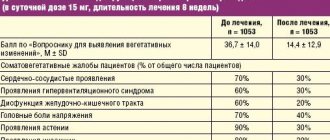The Salvation Clinic provides treatment for panic disorder using the latest achievements of modern medicine. Highly qualified specialists will do everything possible to eliminate feelings of anxiety, improve the patient’s overall well-being, and teach him to cope with his fears. The clinic is recommended for the professionalism and responsibility of its staff, the availability of services and high levels of productivity.
Generalized panic disorder
According to various sources, this type of mental disorder is observed in 8% of the world's population, and the figure is trending upward. It is most common in women over 20 years of age living in cities. Associated with constant stress. The disorder can be caused by:
- death of one of the parents;
- genetic predisposition;
- excessive care;
- negative experiences of early maltreatment.
GAD is 2 times less common in men. The disease is characterized by increased anxiety, and this feeling is not tied to a specific subject or position. Although the patient has fear for his health and the health of loved ones, and various bad premonitions.
Panic disorder treatment
Psychotherapy is mainly used for treatment. As a result of training under the guidance of an experienced mentor, a person finds an explanation for his symptoms. Just visiting a doctor has a positive effect on GAD. The person calms down and begins to understand that, for example, a rapid heartbeat is not the beginning of a serious illness, but simply a normal reaction of the body to a stressful situation. The psychiatrist teaches the patient how to behave in a particular stressful situation, helps to socialize, control feelings of anxiety, and be distracted by various activities.
Relaxation
If the patient’s condition is not advanced, it is advisable to teach relaxation (relieving muscle tension). A decrease in tone can be achieved through physical therapy and massage, psychophysiological techniques, and drug therapy. Relaxation, like meditation, is considered the most effective way to combat stress. The technique is widely used to improve the health of the body, as an addition to hypnosis treatment, and helps relieve mental stress. Particular results are observed in patients with increased muscle tone. Our center conducts group trainings aimed at teaching:
- diaphragmatic breathing techniques (by alternating slow inhalations and exhalations, holding the breath, it is possible to improve blood circulation, the functioning of the bronchopulmonary system, and general well-being);
- progressive muscle relaxation (the technique is based on sequential or simultaneous tension of certain muscle groups, after which a period of relaxation begins);
- self-hypnosis (through self-hypnosis it is possible to achieve control over feelings of anxiety, restlessness, pain, and depressive moods. The technique is effective for insomnia, skin diseases, excess weight, asthma, and low self-esteem).
biofeedback procedure
Biofeedback can be used to relieve anxiety. The technology is based on constant monitoring of certain physiological parameters and their conscious management using microprocessor or computer technology. This technology allows you to obtain information about:
- heart rate;
- brain activity;
- breathing;
- muscle tone;
- blood circulation;
- skin resistance.
The method allows you to eliminate fear, excessive excitement, muscle tension, spasm of peripheral vessels, and voluntarily relax skeletal muscles.
Cognitive-behavioral psychotherapy
One of the most effective methods for treating panic disorder. Allows you not only to exclude symptoms, but also relapse. The method is based on changing the individual’s erroneous beliefs and conclusions, his thinking, and actions by encouraging desired forms of behavior and not reinforcing unwanted ones. During the treatment process, the following goals can be achieved:
- awareness of the influence of fantasies on behavior and emotions (sadness, anger, joy, euphoria, anxiety, anger);
- identifying negative voluntary thoughts and controlling them;
- replacing erroneous ideas with more positive, correct thoughts;
- restoring the ability to adapt to the social environment.
Pharmacotherapy
Anxiolytic drugs (psychotropic substances that reduce anxiety and fear) are used to treat GAD. Drugs are prescribed to quickly regain control of symptoms until the results of psychotherapeutic treatment are achieved. Long-term use of antidepressants is not recommended. Benzodiazepine tranquilizers are prescribed for a period of no more than 20 days. Otherwise, you may develop dependence on these drugs.
Long-term treatment is unproductive. The effect of taking the drugs is observed already in the first 7 days. Improvement in the condition of patients was noted in 75% of cases. It is important to exclude withdrawal syndrome. This is achieved by gradually reducing the dosage of the drug. Other medications are also used to treat anxiety:
- azapyrones;
- SSRI antidepressants;
- hydroxyzine;
- afobazole;
- tricyclic antidepressants;
- β-blockers;
- α-blockers
Treatment of panic disorder in our center is based primarily on group and individual training. We are not supporters of replacing one disease with another. Drug therapy is prescribed in extreme cases; proven drugs that have proven themselves in international practice are used.
Prerequisites for development
It is not known for certain why this disorder develops. There are many theories trying to reveal the mechanism of its development. It has been precisely established that people with a labile (unstable) nervous system are especially prone to developing this condition. They develop tachycardia faster under the influence of emotions or physical exertion, they sweat a lot, are irritable, and blush when excited. It's stuffy for them indoors, they always try to open the windows.
People with accentuated anxiety in their character are also prone to developing the disease. Heredity also plays a role to some extent.
A prerequisite for the maturation of the disorder is the presence of psychotraumatic factors, stressors that upset the functioning of the nervous system. Usually they are the ones that precede the appearance of the first sign of a panic attack.
The first attack of panic overtook Anastasia when she was preparing to go to bed. She was suddenly overcome by the feeling that she was falling rapidly from a cliff into emptiness. She could not move her arms and legs, as if they did not belong to her. There was a strong feeling that she was going to die. She became unimaginably scared.
Then my heart started pounding. It seemed like she couldn't control her breathing. It was confused, frequent, it was difficult to breathe, there was constantly not enough air. This state continued until the morning, and Anastasia was not lucky enough to fall asleep that night.
The next attack occurred 4 days later. Then the frequency of attacks increased, and they overwhelmed the young woman several times a day. Between them she felt outdated and exhausted. She developed an unshakable feeling of fear of falling asleep, since the first attack occurred before bed. She suffered from insomnia, and soon the process of absorbing food was difficult. It happened that while walking down the street or being in a crowded place, she felt dizzy and short of breath.
Then the attacks became less intense and were limited to palpitations and a feeling of anxiety passing through the whole body. Throughout her treatment, she found it difficult to come to terms with the idea that her problem was purely psychological. It seemed to her that the doctors had missed some disease in her body.
Analyzing the situation in a conversation with a psychotherapist, the woman indicated that 5 months before the first attack, she lost her job, and 2 months before that, her child became seriously ill. Thus, the loss of a source of income, and then fear for the life of one’s child, became powerful stress factors that triggered the pathological process.
This pathological condition most often develops in young people aged 20–35 years. Women suffer from it 2 times more often than men.
Depressive panic disorder
GAD can cause depression. This is the most common mental disorder. The person has a depressed mood and a negative orientation. The following symptoms may also occur:
- inadequate feeling of guilt;
- low self-esteem;
- inability to concentrate;
- insomnia;
- lack of appetite;
- thoughts of suicide;
- loss of interest in life, self-realization.
In advanced cases, a depressive triad is observed:
- Bad mood;
- "freezing";
- inhibited locomotion.
The prognosis for cure is favorable. Pharmacotherapy, psychotherapy, electroconvulsive therapy, and physical therapy are used.
What the alarmists are silent about
As a rule, the main symptoms of panic disorder reported by people suffering from it are fear, anxiety, and discomfort in the body. But few people point out such signs as depersonalization and derealization .
Derealization is an unrealistic perception of the world, manifested as a feeling of fog enveloping the patient. Through him, everything seems somehow distant, vague, detached.
The girl describes her attacks of derealization as an alien perception of everything that habitually surrounds her. Even when she is in her room, she does not recognize her. It's like she's an alien who accidentally came down here from outer space. Things around are fuzzy and lifeless. I want to find some kind of support, a landmark, but I can’t. Close people look like strangers.
Depersonalization is felt by her as existing outside her body, as if she is looking at herself from the outside. At such moments, she cannot control her thoughts and movements, she does everything automatically.
People with PD often experience auditory and visual hallucinations , especially before bedtime. They appear in the form of a distinct squeak or rustling sound, blurred visual images, and voices talking to each other.
Panic attack disorder
A panic attack is characterized by an intense attack of fear. In humans:
- blood pressure increases;
- tachycardia is noted;
- excessive sweating;
- he “throws” either into trembling or fever;
- rapid breathing;
- shortness of breath due to excess oxygen;
- dizzy;
- arms and legs go numb;
- tingling appears in different parts of the body.
The patient feels that he is about to lose consciousness, go crazy, die because he has a lump in his throat and has lost his breath, or because his heart is about to jump out of his chest, which a heart attack or stroke will occur. Such regular attacks lead to panic disorder. Episodic cases do not cause illness and are not a prerequisite for the situation to reoccur.
Mechanism of attack
The human brain reacts to external stimuli in different ways, but triggers a single defense mechanism at the first sign of approaching danger. During a panic attack, a threat is signaled even if it does not actually exist. Tension in all parts of the nervous system increases fear. On a physiological level, this manifests itself in the production of large amounts of the stress hormone (cortisol), followed by a powerful surge of adrenaline.
The brain gives a command to the body to save life in any way, increasing the intensity of the manifestation of physical symptoms. If the threat is real, such hormonal surges can make a person stronger and more resilient, in this state he can do a lot. But if this happens in a state of rest, when there is no need to run anywhere and defend yourself, then there is a negative impact on mental health. The danger lies in losing control over your actions and thoughts.
Anxiety panic disorder
To be diagnosed with the disorder, a patient must have anxiety symptoms most of the time for at least a month. The appearance of depressive disorders does not exclude this diagnosis as the main one. Generalized panic disorder should not be confused with astheno-neurotic syndrome, in which there is rapid fatigue, decreased mental and active activity, and outbursts of anger for no particular reason. Neurasthenia appears as a result of previous infectious diseases against the background of chronic intoxication due to excessive consumption of alcoholic beverages, constant lack of sleep, poor diet, lack of proper rest, and endocrine disorders.
Generalized panic disorder can occur due to an overactive thyroid gland, which is characterized by excessive production of triiodothyronine and thyroxine. Hormones influence almost all physiological processes occurring in the human body:
- metabolism;
- mental development;
- height;
- heart rate;
- thermoregulation.
Thyroxine enhances oxidative processes in the cells of the brain and other vital organs, is important for the development and differentiation of all cells of the body, and stimulates the conversion of vitamins. To make an accurate diagnosis, it is recommended to conduct an examination of the thyroid gland.
Uncontrolled anxiety and restlessness can also occur with coronary heart disease, with a strong concentration of drugs in the blood or with a withdrawal symptom.
What happens during an attack
The patient’s first attacks occur after a strong emotional shock; it is this that provokes the severity of the disease increasing each time. Next, a certain trigger is needed for the paroxysm to take possession of the person again.
A similar factor may be close contact with other people, strong sound or unpleasant smell. Most often, triggers are associated with a traumatic situation. At first, the heart rate increases, the sweat glands begin to work to the maximum. They produce a large amount of sweat, perspiration appears on the forehead, and their hands become damp.
After a few minutes, panic sets in, the manifestation of which will vary from person to person. Some experience a strange feeling of confusion, forget where they are going, others are overcome by severe fear. They seem to freeze in one place, not finding the strength to make any movement.
The attack can last several minutes, for some it ends after one or two hours. The specificity of PA is the high rate of increase in symptoms. After the first attack, there is constant anxiety and concern for one’s health on a subconscious level. All organs and systems can operate uninterruptedly. Our clinic provides treatment for mental disorders; here you can undergo treatment for mental retardation and schizophrenia, and receive professional help in correcting the consequences of dementia and other pathologies.
Anxiety disorder with panic attacks
The Salvation Clinic has been treating anxiety disorders for several years. We use radical psychotherapeutic techniques, proven drug therapy, and have good technical and personnel potential. Other advantages of the clinic:
- a psychotherapist visiting your home;
- active dialogue between doctor and patient;
- 100% confidentiality;
- many years of work experience;
- guarantees of the effectiveness of treatment and the quality of psychotherapeutic assistance;
- availability of a specialized hospital;
- respectful attitude towards patients;
- 24-hour counseling;
- availability of services.
You can contact us right now. We are ready to listen and help. Call, don’t put off solving the problem for too long, time only makes the situation worse!
Progression and consequences of lack of treatment measures
Intensive, well-chosen therapy allows you to quickly achieve positive dynamics and improve your emotional state. But what happens if you ignore the problem and hope that everything will resolve itself?
First of all, it is worth noting that panic or anxiety syndromes themselves are quite normal. Man is a biosocial being, overwhelmed by a whole spectrum of feelings and emotions. And here it is very important to distinguish between two states: banal concern about some event and a real anxiety attack. If seizures become systematic, one should not hope that they will disappear over time. The longer you ignore what is happening, the worse the situation will become.
What exactly happens if there is no proper treatment program that can improve mental balance?
- “isolation of affect” is formed when attacks cease to cause fear, while simultaneously reducing the quality of life;
- Nervous exhaustion occurs, often leading to serious health problems;
- the number of seizures increases, and the intervals between them become shorter and shorter.
Women are especially susceptible to progression, and therefore must pay more attention to their condition. In rare cases, refusal to take medications and participate in psychological consultations becomes the cause of the development of other, no less serious pathological processes.
Preventive measures
Those who properly carry out all the tasks of the attending physician quickly achieve positive changes and can even count on remission. But therein lies the main catch. Many people mistakenly believe that if panic attacks have subsided for a month, they will not return in the future, and therefore they stop following the instructions of the neurologist. The result is a serious relapse.
Prevention can help avoid this, including:
- adherence to sleep and rest patterns;
- sufficient fluid intake (you can also drink soothing teas - green, mint, etc.);
- refusal of overwork, overwork;
- proper diet enriched with healthy vitamins and microelements;
- regular and timely consultations with a specialist;
- taking maintenance medications (only as directed by a doctor!);
- breathing exercises (they help relieve psychological pressures, take a break from everyday hustle and bustle and routine, relax, put your thoughts in order);
- meditation (another way to relax after a grueling workday);
- exclusion of external factors that can plunge you into a stressful state.
By following the above points, you will ensure the proper stability of remission and prevent the occurrence of new panic attacks and attacks.
Self-medication
Many people do not seek help from doctors until the very end, preferring a variety of self-medication practices. Of course, in some cases you can solve the problem yourself, but there is a high probability of developing negative side effects and syndromes. That is why experts highly recommend making an appointment with a neurologist at the first symptoms. A timely examination will allow you to quickly understand the cause of the disease and create a suitable recovery program.
It was already noted above that the same treatment sometimes gives completely different results: someone will feel relief and calm down, while others, on the contrary, will receive a new outbreak of tension. That is why a thorough diagnostic analysis is required, aimed at studying adaptive, mental and neurological functions. As a rule, specialists give an appointment for blood donation, conduct a consultation, and collect anamnesis. The listed activities allow you to most accurately select rehabilitation and recovery measures that help achieve positive dynamics.
Remember: you are at risk every time you resort to self-medication. Only a doctor is able to correctly determine the diagnosis and correctly prescribe medications. Therefore, do not be lazy to visit specialized institutions, take tests and undergo examinations.










